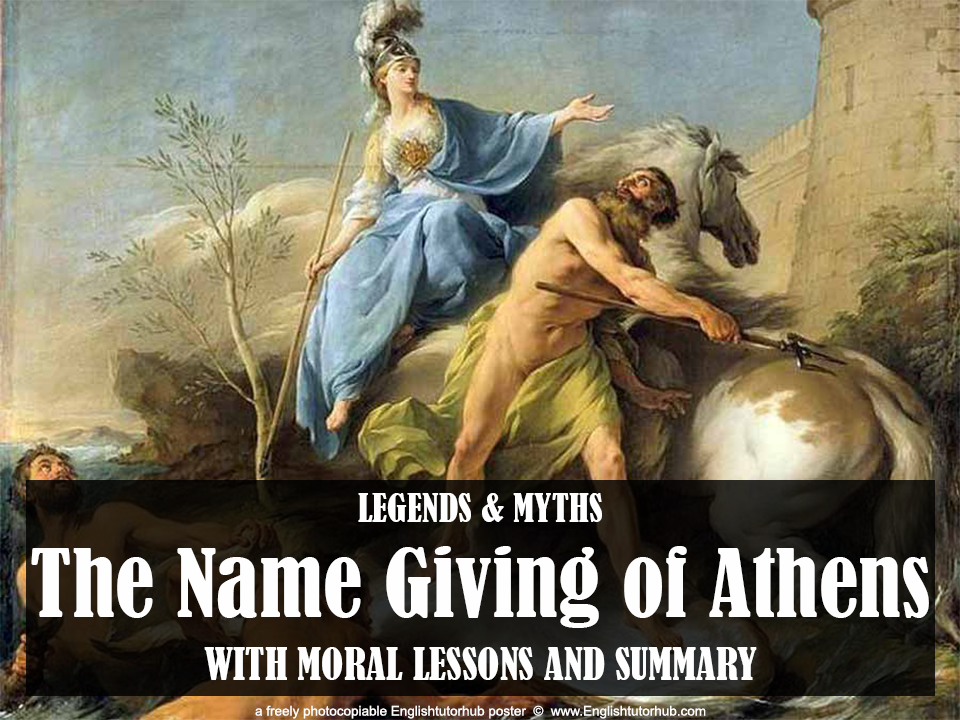THE NAME GIVING OF ATHENS – How Athens got its name? Here’s the story of the name giving of Athens with a moral lesson and summary. The city was named Aktaio or Akti before the gods intervened.
The story is one of the founding myths of ancient Athens, thus famous to lovers of Greek mythology.
Do you want to know why they changed the city’s name to Athens? Keep on reading to learn more.

The Name Giving Of Athens
In a mythical time in the past, Ancient Athens, a walled city and a great state, was the cradle of civilization, especially in Greek mythology. Its original name was Aktaio or Akti, taken from its first king, Aktaios.
Its second name is Cecropia, derived from the name of King Cecrops. A half-man and half-snake strange creature that develops the city in all its glory.
During those times, the gods wanted to have cities under their protection. The gods longed for the humans to honor them and wanted to build temples and bring gifts to them.
Eventually, the gods saw the prosperous land of beauty and wanted to name it after them and became its patron. Two gods wanted the same city and ended up quarreling with each other.
The most persistent rivals were Athena, the goddess of wisdom, and Poseidon, the sea god.
Athena, the goddess of wisdom, courage, and war, was the daughter of Zeus and the nymph Metis. Weirdly, Zeus swallowed Metis whole, for he heard in a prophecy that his child with her would rule the sky.
Sometime later, Zeus suffered from a headache that worsened over time, which caused his great suffering. Hephaestus, the god of fire and smithing, helped his father by taking an ax and opening Zeus’s head.
From there came the now full-grown woman with armor, spear, and shield. Zeus proclaimed her name to be Athena, the goddess of wisdom.
Unlike Athena, Poseidon was the brother of Zeus and the god of the sea. He was one of the children eaten by their father, Cronus, and later freed by Zeus.
Another vital aspect of Poseidon was his power to make earthquakes.
These two gods showed interest in Cecropia to be their city.
Zeus thinks of a solution to solve their dispute.
He decided that each of them would make a gift for the city, and King Cecrops and the mortals living there would determine what gift was the best, and whoever won would be the city’s patron.
The time comes to set the battle on Acropolis Hill. The remaining gods of Olympus arrived and had a panoramic view of the city.
Cecrops and the residents of Cecropia also went to the hill to watch and be the judge of the gifts of Poseidon and Athena.
The first to present his gift was Poseidon. He stepped forward, and with his trident, he struck a rock. Instantly, a spring of water gushes forth from the ground. It formed a lake and was called the Erechtheida Sea.
He assured that the citizens would have water and no drought. However, the people weren’t enchanted with his gift, for the water tasted salty like the waters of the sea he ruled.
Next, it’s the turn of Athena to give her gift to Cecropia. She stepped forward and planted a seed on the ground. Immediately, an olive tree grew from the ground with lots of fruit.
The citizens of Cecropia loved the gift of Athena the most, for it would give them food, oil, and firewood.
After both gods had offered their gifts, Zeus asked the opinion of King Cecrops about who will be the winner. The king glanced at the lake of salty water and the tree of Athena.
He thought the tree was the first in the country and would bring glory to the city with this unique and valuable gift.
Therefore, King Cecrops proclaimed that Athena’s gift was most helpful and was entitled to the city’s patronage. And so the city was renamed Athens, after the goddess Athena.
Poseidon, on the other hand, couldn’t accept defeat. He cursed the city for never having enough water, and the city began to have problems with water scarcity.
Story Analysis of The Name Giving Of Athens
Indeed, the people of Athens honored the goddess for its valuable gift. They built temples and dedicated festivals too.
In the story, she proved that she is the goddess of wisdom, for she thought of a gift that would benefit everyone. The olive tree has many practical uses that are known and priced much today.
The myth has a resemblance to reality. Until today many olive trees grew around Athens, and water drought is visible in the city.
The Name Giving of Athens Moral Lesson
- Live a good life then and now, for you will be remembered forever.
- Athena gave the people a valuable gift, the olive tree. It has many uses, which is why the city was named after her as a sense of thanksgiving to the goddess. They loved the goddess for her goodness and even created beautiful temples in her honor.
- People often want to win, but only a few accept defeat.
- In the myth, Poseidon gave a gift of sea salt water, and the people disliked it. He couldn’t accept defeat, so he cursed the city in drought. It could have been better if he had taken his loss and never cursed the city.
The Name Giving of Athens Summary
The mythical story tells us that two gods, Poseidon, the sea god, and Athena, the goddess of wisdom, competed to become the patron of Cecropia. This city was great, a cradle of civilization, and ruled by a half-man and half-snake, King Cecrops.
Zeus thought of resolving the conflict by letting them give a gift to the city, and King Cecrops and the residents would decide who had the best gift and became the city’s patron.
As his gift, Poseidon struck a rock, and a spring of seawater came out. But, the people needed to be enchanted with his gift. Athena planted a seed on the ground as a gift. It grew into an olive tree, and the people liked it because it was helpful.
At last, King Cecrops proclaimed that Athena had the best gift and was held the city’s patron. The city was then named Athens in honor of her. Later, they made temples and gave her gifts to glorify her.
Click and read these articles to learn more
- The Story Of Hephaestus With Moral Lesson And Summary
- Clash Of The Titans Story With Moral Lesson And Summary
- The Three Sisters Of Fate Story With Moral Lesson And Summary
- Prometheus And The Theft Of Fire Story Moral Lesson/Summary
- The Abduction Of Persephone By Hades Story Moral/Summary
Learn with englishtutorhub.com

